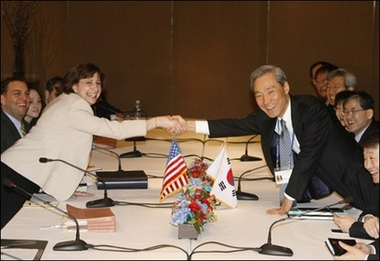FTA talkers reveal their sneaky tricks
Chosun Ilbo (Seoul) | 15 March 2007
FTA Talkers Reveal Their Sneaky Tricks
The atmosphere between Korean and U.S. trade negotiators soured during sectional talks on Monday, the last day of the eighth round of free trade talks at the Hyatt Hotel in Seoul. Korea’s chief negotiator in charge of the section threw some documents and threatened to walk out after the U.S. suddenly attached a new condition as the two sides were nearing a conclusion.
In the end the U.S. backed down and an agreement was reached. But this wasn’t the only case of low tactics and high tensions during the trade talks that spanned nine months and two continents. Here is a glimpse into what has gone on behind those closed doors.
◆ Insults and rude tricks
With each side struggling to gain an advantage over the other, diplomatic courtesies weren’t always followed. The diplomats would at times jump to their feet in anger or even flat-out insult the other side. For example, when the Korean negotiators demanded an increase in how much foreigners can own in U.S. telecom companies, the Americans told them to forget it — because the Koreans didn’t have enough money to afford them.
A leading Korean negotiator said that both teams frequently used tactics to take control of the talks or confound the other side. “We would leave the room on the pretext of going to the bathroom, but then we wouldn’t come back for 30 or 40 minutes,” he said.
◆ Unofficial contact
The talks weren’t limited to the conference tables. Sometimes the negotiators from both sides would continue their discussions and build up trust over a meal or drinks outside the official negotiating venue. And they weren’t drinking water: “One night we were downing boilermakers with the U.S. team,” a top Korean negotiator said.
◆ Language as a weapon
Because most of the Korean team members have master or doctoral degrees from American universities, they’re fluent in English and the negotiations took on a format where sectional chiefs speak directly to the U.S. delegates in English.
While translators were used when issues became so specific that the negotiators had to have a precise understanding of the details, the Koreans weren’t afraid to dismiss them when they thought it would give them an advantage. A Korean chief sectional negotiator said, “Sometimes we didn’t use translators on purpose because then we could deny a previous agreement, claiming that we made a mistake because of our poor English.”






